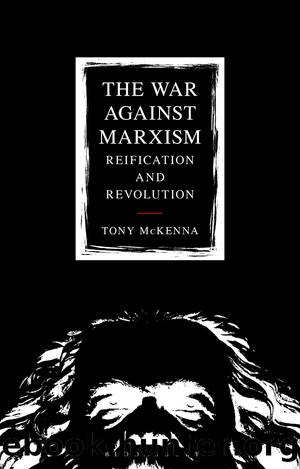The War Against Marxism by Tony McKenna;

Author:Tony McKenna;
Language: eng
Format: epub
Publisher: Bloomsbury UK
Chapter 5
Literary Theory and the loss of the historical totality
Literary Theory is almost as old as ancient Greek philosophy itself and goes back to Aristotle at least where, in his Poetics, he formulated aesthetic principles of comedy and tragedy. In the twentieth century, however â co-extensive with the rise of universities and the type of education which would facilitate a wider demographic than the elite bastions of old â the shape and contours of a new type of Literary Theory began to attain definition. It drew sustenance from the Russian formalism which developed in the context of the 1917 revolution, but perhaps the strongest impetus to modern-day Literary Theory came from the structuralist linguistics of the 1950s (influenced by Ferdinand de Saussure) and the structuralist anthropology of Lévi-Strauss, along with their post-structuralist and post-modernist successors such as Derrida and Bathes, and also the increasingly fashionable psychoanalytic theory of figures like Freud and Lacan.1
This threadbare summary might briefly be supplemented by pointing out that Literary Theory and its components were often evolved out of the need to destroy the âgrand narrativeâ, the type of theories which tried to form a totalizing and coherent picture of the historical process as a whole, with its own necessary and immanent logic, and to draw political and aesthetic conclusions within the light of that overarching âobjectivistâ framework. In the febrile environment of the early seventies, as the Civil Rights movements went into retreat, as neoliberalism secured its first substantial foothold in the bloody laboratory of Chile, and as the beginnings of a great and sweeping process of de-industrialization set in across the First World countries, the sense of radical political possibility felt increasingly illusory. Where once the clash of classes and the struggle for revolution held sway, now such living social categories had been supplanted in favour of a strange and eerie terrain in which reality was âdecentredâ, causes had become âabsentâ, and âsignifiersâ, rather mysteriously, tended to âfloatâ.
A more detailed analysis of Literary Theory is beyond the scope of this chapter, but what I want to look at here is how two thinkers who locate themselves in the Marxist tradition have sought to fuse Marxism with some of the main strands of Literary Theory. In so doing they have managed to propel themselves into incredibly prominent positions as celebrity intellectuals who sell millions of books and are invited to make speeches across the globe. I want to examine these thinkers as a way of demonstrating how the trends they mobilize in Literary Theory are, in fact, anti-Marxist. Again I am not trying to give an assessment of these thinkers as a whole; I do not propose to provide an overview of their body of work and their place in Literary Theory more broadly â something I am less than qualified to do.
What I aim to achieve is to once more focus on that very specific question of class and its role in the Marxist theory of history: how â in adopting some of the
Download
This site does not store any files on its server. We only index and link to content provided by other sites. Please contact the content providers to delete copyright contents if any and email us, we'll remove relevant links or contents immediately.
The remains of the day by Kazuo Ishiguro(8390)
Tools of Titans by Timothy Ferriss(7811)
Giovanni's Room by James Baldwin(6808)
The Black Swan by Nassim Nicholas Taleb(6762)
Inner Engineering: A Yogi's Guide to Joy by Sadhguru(6440)
The Way of Zen by Alan W. Watts(6288)
Asking the Right Questions: A Guide to Critical Thinking by M. Neil Browne & Stuart M. Keeley(5355)
The Power of Now: A Guide to Spiritual Enlightenment by Eckhart Tolle(5331)
The Six Wives Of Henry VIII (WOMEN IN HISTORY) by Fraser Antonia(5235)
Astrophysics for People in a Hurry by Neil DeGrasse Tyson(5000)
12 Rules for Life by Jordan B. Peterson(4160)
Housekeeping by Marilynne Robinson(4059)
The Ethical Slut by Janet W. Hardy(4040)
Skin in the Game by Nassim Nicholas Taleb(3965)
Double Down (Diary of a Wimpy Kid Book 11) by Jeff Kinney(3924)
Ikigai by Héctor García & Francesc Miralles(3889)
The Art of Happiness by The Dalai Lama(3844)
Skin in the Game: Hidden Asymmetries in Daily Life by Nassim Nicholas Taleb(3720)
Walking by Henry David Thoreau(3681)
